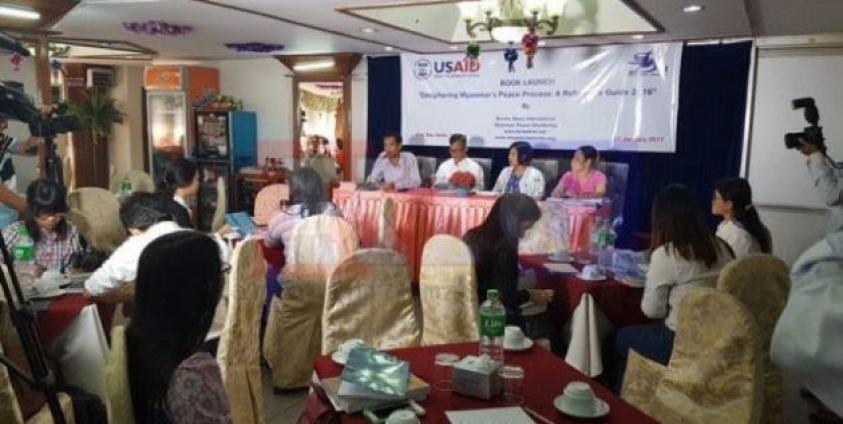Conflicts have increased in ethnic areas after the new Burmese government held the Union Peace Conference (21st Century Panglong Conference) last August, claimed Nai Kasauk Mon, executive director of the Burma News International (BNI).
He was speaking at the launching ceremony of the 2016 Peace Process Reference Guide, which was compiled by BNI.
The book launching ceremony was held at City Star Hotel in Rangoon on 27 January from 10 am to 12 pm.
Nai Kasauk Mon explained that the peace process in Burma is weakening after 2016 and more conflicts have taken place in ethnic areas after the 21st Century Panglong Conference.
“The 21st Century Panglong [Conference] exposed the issue both sides couldn’t agree on. The Burma Army wants to set up a federal [system] with the 2008 [Constitution]. The ethnic people don’t want to set up the federal [system] with it. The opposite views emerged at the 21st Century Panglong [Conference]. That’s why conflicts and clashes have broken out after the 21st Century Panglong Conference. The Burma Army has seized the Kachin army (KIA)’s bases. On the side of the ethnic [armed organizations], the Northern Alliance attacked Muse so more conflicts have been seen at the end of the 21st Century Panglong Conference,” said Nai Kasauk Mon.
The 2016 Peace Process Reference Guide uses facts and references in describing the number of clashes that broke out in ethnic areas within 2016, peace dialogues, the situation of local IDPs and refugees, ethnic armed organizations, and the peace process carried out by the new government.
Mai Cherry Zahau, a human rights activist who led the discussion at the book launching ceremony, said: “The word ‘rebel’ was no longer used and the word ‘ethnic armed organization’ has been used instead since 2014. Now, we seem to be stepping backwards. Now, the word ‘insurgents’ has been used frequently. If we look from all side, there isn’t anyone who will stand on the side of the ethnic people.”
Although the Karen National Union (KNU) has signed the nationwide ceasefire agreement, the Karen State and nearby areas that are under its control have encountered many issues last year including skirmishes, business projects carried out on pretense of development, and uncertain future of the IDPs and refugees. Journalists from ethnic-based media do not receive any security guarantees from armed organizations and they have to do self-censoring when they are writing the news, explained Nan Paw Gay, chief editor of the KIC (Karen Information Centre).
Ko Htet Aung, the coordinator of the Peace Process Reference Guide, also explained that international donors have contributed to the compiling of the book but it was carried out independently without any influences from anyone.
BNI has published the Peace Process Reference Guide since 2013 and this is its fourth edition, according to BNI officials.
Translated by Thida Linn








